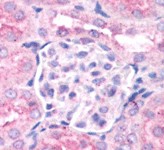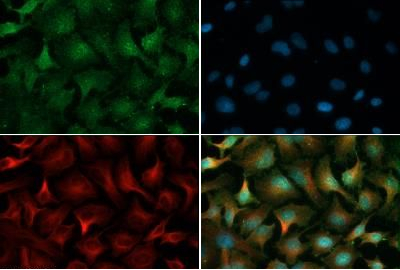| Gene Symbol |
Egln1
|
| Entrez Gene |
112405
|
| Alt Symbol |
AI503754, C1orf12, HIF-PH2, HPH-2, Hif-p4h-2, ORF13, Phd2, SM-20
|
| Species |
Mouse
|
| Gene Type |
protein-coding
|
| Description |
egl-9 family hypoxia-inducible factor 1
|
| Other Description |
HIF-prolyl hydroxylase 2|egl nine homolog 1|hypoxia-inducible factor prolyl hydroxylase 2|prolyl hydroxylase domain-containing protein 2
|
| Swissprots |
Q91YE3 Q922P3 Q8VHJ2
|
| Accessions |
EDL11790 Q91YE3 AF453878 AAL65165 AJ310546 CAC42515 AK084519 BC006903 AAH06903 BC083146 AAH83146 CJ181087 XM_006530578 XP_006530641 NM_053207 NP_444437
|
| Function |
Cellular oxygen sensor that catalyzes, under normoxic conditions, the post-translational formation of 4-hydroxyproline in hypoxia-inducible factor (HIF) alpha proteins. Hydroxylates a specific proline found in each of the oxygen-dependent degradation (ODD) domains (N-terminal, NODD, and C-terminal, CODD) of HIF1A. Also hydroxylates HIF2A. Has a preference for the CODD site for both HIF1A and HIF1B. Hydroxylated HIFs are then targeted for proteasomal degradation via the von Hippel-Lindau ubiquitination complex. Under hypoxic conditions, the hydroxylation reaction is attenuated allowing HIFs to escape degradation resulting in their translocation to the nucleus, heterodimerization with HIF1B, and increased expression of hypoxy-inducible genes. EGLN1 is the most important isozyme under normoxia and, through regulating the stability of HIF1, involved in various hypoxia-influenced processes such as angiogenesis in retinal and cardiac functionality. Target proteins are preferencially recogniz
|
| Subcellular Location |
Cytoplasm {ECO:0000250|UniProtKB:Q9GZT9}. Nucleus {ECO:0000250|UniProtKB:Q9GZT9}. Note=Mainly cytoplasmic. Shuttles between the nucleus and cytoplasm. Nuclear export requires functional XPO1. {ECO:0000250|UniProtKB:Q9GZT9}.
|
| Tissue Specificity |
Expressed in heart, brain liver, skeletal muscle and kidney. Low levels were detected in the lung. Constitutively expressed during differentiation of C2C12 skeletal myocytes. {ECO:0000269|PubMed:12234095}.
|
| Top Pathways |
Renal cell carcinoma
|
![Western Blot: EGLN1/PHD2 Antibody [NB100-2219] - Detection of EGLN1/PHD2 in mouse kidney lysate using NB 100-2219. ECL exposure, 20 seconds.](http://www.bioprodhub.com/system/product_images/ab_products/5/sub_6/26281_EGLN1-PHD2-Antibody-Western-Blot-NB100-2219-img0013.jpg)


